« The Fulani must be asked to settle and to plant trees »
Some time ago I attended the launch of a project, the purpose of which was to lend support to Fulani herders. The official start took place in the presence of the Governor of the region. I was stunned to hear the Governor tell the project managers : « Fulani herders must be called upon to settle and to plant trees ! ». As if the Fulani were not already settled !
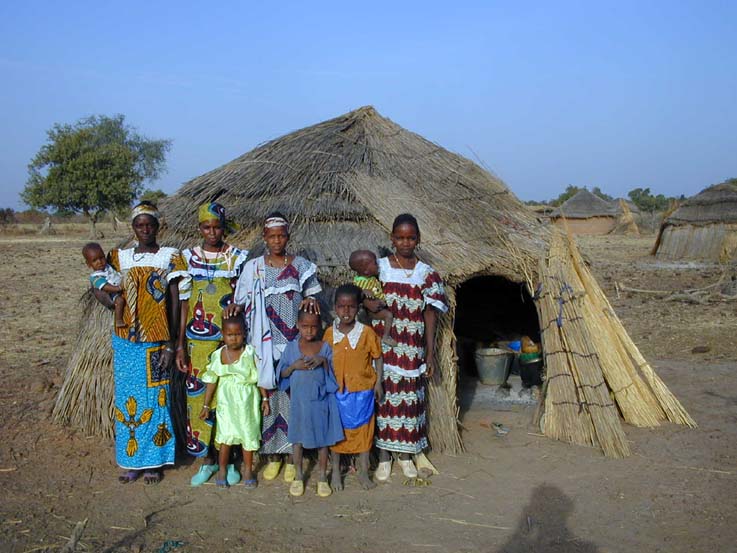
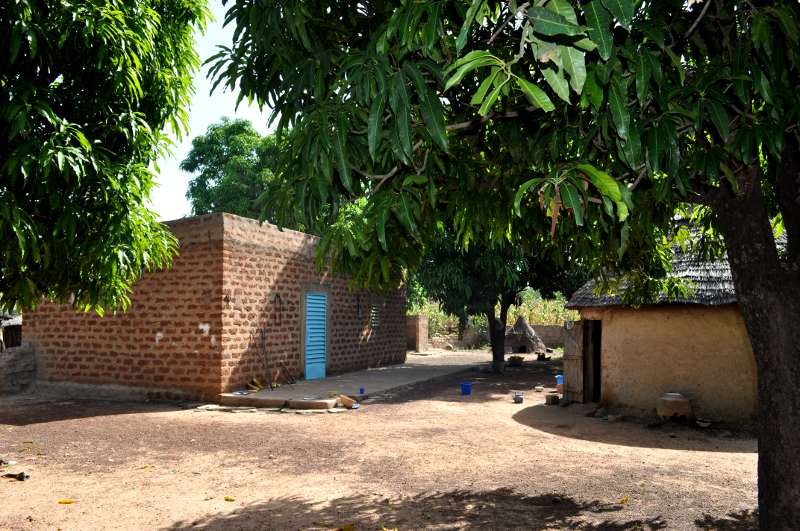 A Fulani family, Loroni village at the border with Mali 1976 South of Fara . A hardwall brick house If he had at least referred to their herds, I might have understood, albeit without totally agreeing with him. In the 70ies and the 80ies I had Fulani friends north of Tougan (in the north east of Burkina), who lived in huts that they themselves built. Between the dry and the rainy season they moved on, 15 to 20 km. During the rainfalls they went up to a slightly elevated area, so that men and cattle would not have to sleep in mud.
A Fulani family, Loroni village at the border with Mali 1976 South of Fara . A hardwall brick house If he had at least referred to their herds, I might have understood, albeit without totally agreeing with him. In the 70ies and the 80ies I had Fulani friends north of Tougan (in the north east of Burkina), who lived in huts that they themselves built. Between the dry and the rainy season they moved on, 15 to 20 km. During the rainfalls they went up to a slightly elevated area, so that men and cattle would not have to sleep in mud.
But today the many Fulani I meet no longer sleep in huts. Sometimes they have homes made of mud brick with a thatched roof, much like the traditional Mossi dwellings. But they now increasingly have nice « hard wall » houses of brick and mortar, at times with a nice courtyard with mango or neem trees.
Nevertheless I stopped to talk to one of them south of Fara (south of the Poura gold mine). I asked him since when they had arrived « here ». He told me that he did not know exactly, but that it was well before the arrival of the white man ! That is, more than a century ago.
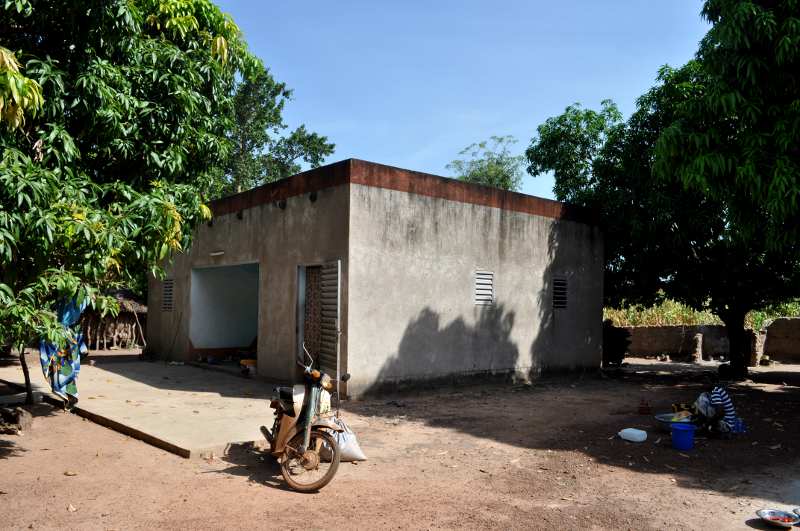
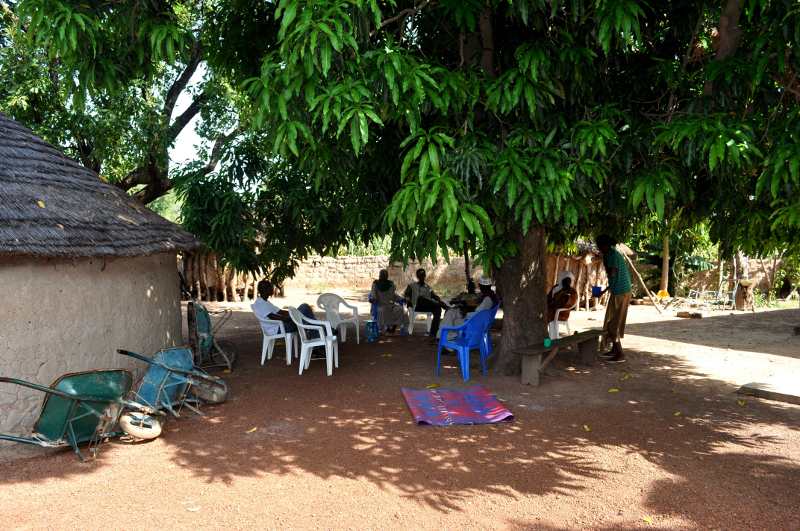 At the same house : a pleasant courtyard and a beautiful mango tree. It is nice to sit in the shadow under the mango tree I asked him if his people migrated with their herds. He said : « Yes, since about 8 or 10 years. Before there was enough land for us and our animals. But now, in particularm there are too many forest fires. I went on to ask how their migration was organized and in partucular if the women came along with the herd. He told me that only the « children » (the younger generation), men between 30 and 40 years of age, left on migration. All the herds of the villge were first assembled and a dozen of men (no women) were selected to accompany the animals, in other words a dozen men out of a population of 300 to 400 Fulani, or not even 4% of the population.
At the same house : a pleasant courtyard and a beautiful mango tree. It is nice to sit in the shadow under the mango tree I asked him if his people migrated with their herds. He said : « Yes, since about 8 or 10 years. Before there was enough land for us and our animals. But now, in particularm there are too many forest fires. I went on to ask how their migration was organized and in partucular if the women came along with the herd. He told me that only the « children » (the younger generation), men between 30 and 40 years of age, left on migration. All the herds of the villge were first assembled and a dozen of men (no women) were selected to accompany the animals, in other words a dozen men out of a population of 300 to 400 Fulani, or not even 4% of the population.
The migration lasts about 5 months (around Batie and Ghana) from the end of January/beginning of February to the end of June/beginning of July.
As I learnt that the women did not leave with them, I wondered how the men on migration were fed. I was told that their main food was bassi (couscous made of millet) diluted in milk, and sometimes they also had yam.
The two other Fulani whom I interviewed these days live in the Founzan region (one in the west. The other in the south). Both were born in the village where they live today, one in 1935 and the other in 1943 or 1942.
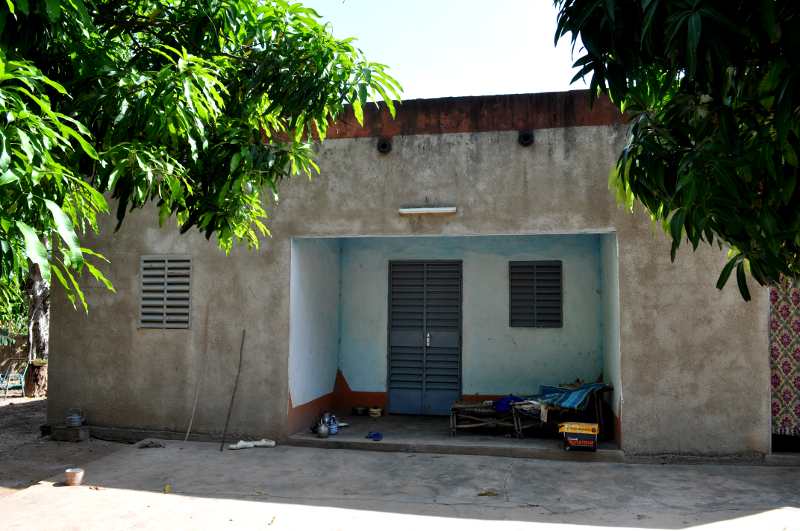
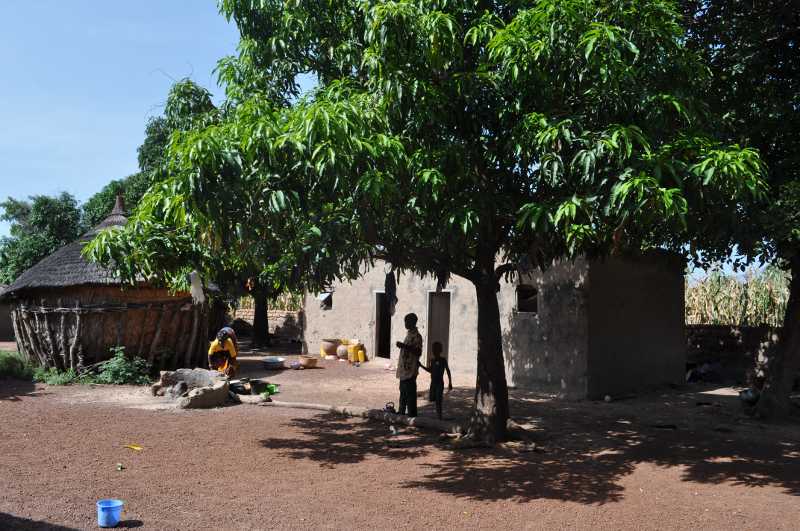 They have ineed fully well settled down, some of them a long time ago. In spite of this, they ar often short of land. They rarely own the land on which they live. That is why they do not have the right to plant trees.
They have ineed fully well settled down, some of them a long time ago. In spite of this, they ar often short of land. They rarely own the land on which they live. That is why they do not have the right to plant trees.
The Fulani family in this courtyard settled here in the 19th century Admire the barn of the Fulani family – evidence that they too have become farmers One would really have thought that the governor knew all this very well. To ask Fulani to settle could therefore be a way of holding them responsible for the ever more frequent clashes between herders and farmers, notably conflicts about tenure rights around pasture land, which farmers would like to take possession of. We will come back to this. It is even likely that it will be one of the major issues of our newsletter, since notheing has yet been settled.
When I hear or read, almost daily, that much farmland in Burkina is not in use and when at the same time I see that traditional herders no longer have pasture land for their herds, I find that some hard questions must be asked.
On reading that the population of Burkina doubles every 25 years, while at the same time multinational corporations are offered hundreds of thousands of hectares to grow biofuel Jatropha, I get the impression that more consideration is given to the future of rich countries and large fuel consumers, than to the future of the people of Burkina.
Koudougou, October 9th, 2011
Maurice Oudet
Director, SEDELAN









